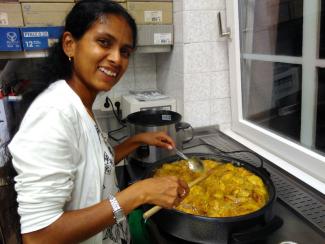Weltwärts
Shared norms

I am a psychologist and come from Tarikere, a small town in the south Indian state of Karnataka. In my home country, I work as a counsellor for a non-governmental organisation (NGO) called VIKASANA on a part-time basis, focusing on street children, single parents, school dropouts and child labourers. They struggle with issues such as home sickness. Many kids are slow learners and do not speak our language well. We play games and offer various activities that help them to learn and improve their behaviour.
In Germany, I worked for a German NGO, Karl Kübel Stiftung (Karl Kübel Foundation), which is a partner of VIKASANA. Its focus is on children and families. I was supporting the foundation’s international development department at the head office in Bensheim, a small town near Frankfurt. I did office work, hosted seminars at German schools and even did a cooking lesson to promote fair-trade shops. I have also contributed to preparing German weltwärts-volunteers for their stay in India.
It was fascinating to be in touch with several other German NGOs that are involved in rehabilitating people with disabilities, including mental and psychological challenges. I got the opportunity to visit CBM, the international NGO that specialises in disability issues, which is also based in Bensheim.
After I was selected for weltwärts, I was a bit nervous and worried about cultural differences. I thought Germans are very punctual, task-oriented and not very flexible. Would I be able to manage? And would I fit into my host family? It turned out that my concerns were exaggerated. My time in Germany proved very nice and very useful.
In Germany, I took the initiative to interact with older Germans to understand the country’s development. I now see that Germany used to have some problems India still has today, concerning social, economic and development issues. I find that India’s and Germany’s guiding norms are actually quite similar, but they are not implemented everywhere. In Germany, they tend to be better implemented than in India, and government agencies are promoting those norms. In Germany, everyone gets an education, so the basic understanding of the legal system and governance principles is much stronger. Germans also seem more prepared to take the initiative to try to make a difference. In Indian society, which is much poorer, people tend to be so busy with their own worries that they focus less on social issues.
I have observed that Germans tend to be more independent persons than Indians and that the sense of independence is even fostered in young children. It matters that kids are not only taken care of by their families. Most young children spend at least some hours every day in a nursery school, which has to meet considerable educational standards. In India, things are completely different. Family ties matter more than they do in Germany, and that makes life particularly hard for children from dysfunctional families.
I used to be quite shy and found it hard to speak in front of an audience. But I have been developing more self-confidence and am now proud to say that I can do presentations and even improvise, if needed. Being in Germany has been very helpful in this respect. I have become more independent, more eloquent and better informed concerning my profession. My self-confidence has grown.
Volunteering in Germany has helped me to understand the cultural differences and the similarities. It served my personal growth, and my ideas of what I want to do with my life have become clearer.
Vidya Varghese is 26 years old and was a weltwärts volunteer from India. The weltwärts programme has allowed young Germans to gather experience in developing countries since 2008. Weltwärts volunteers from developing countries have been coming to Germany since 2013.
vidyavarghees@gmail.com
Link
weltwärts:
www.weltwärts.de/en







